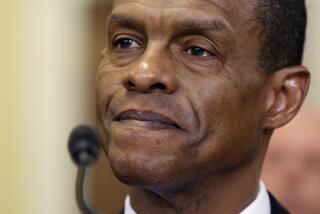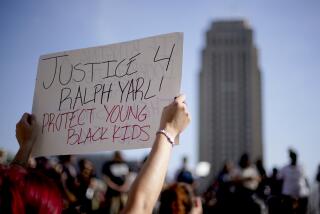Strong feelings and special orders
- Share via
I write in response to Earl Hutchinson’s opinion piece, “Street Violence and Special Order 40.” I take no stand on the order itself; Hutchinson makes a number of excellent points on the subject, both pro and con. I simply want to take exception to an emphasis he makes about feelings rather than facts, because strong feelings can make for weak reasons.
He recounts, with disapproval, how Los Angeles Police Chief William J. Bratton responded to fears that Latino gangs may be targeting blacks by producing statistics that “the majority of killings of blacks are by other blacks, not Latinos.” Hutchinson goes on to note the long history of violence against blacks in this country, and that during its peak, “the overwhelming majority of blacks who were killed were murdered by other blacks.”
Along the way, however, he notes that “it certainly makes no difference that so few blacks are killed by non-blacks.” I think by this he simply means that the details don’t matter, that the violence was horrific and that the horror bred fear. But the problem is that some of these specific fears may be at odds with the facts. Hutchinson insists that these fears are not simply “paranoia” -- but that is actually a handy and common term for a fear that isn’t based on fact.
I’ve read this section of his piece over and over, and I can’t make it add up to anything other than something like this: When people have strong feelings about a subject, it doesn’t matter what the facts are. You must respond to those feelings.
This is actually a wise statement when it comes to handling things like spats with loved ones over taking in the garbage cans or remembering to drop off the mail. But it is not a principle that makes for good public policy.
Feelings should not trump facts.
Still, it’s easy enough for many of us to blind ourselves from tough realities. Let’s remind ourselves: This is a matter of real life and death to far too many -- because people they know are being shot dead. When you feel unsafe in your own neighborhood, you are not likely to nod calmly when someone asks you to step back and look at the big statistical picture. Instead, you are going to get good and angry.
It is this anger, this “fear, rage, and panic,” that Hutchinson seems to emphasize. He notes with approval that Bratton backed off an earlier emphasis on “just the facts” and instead began to respond to the “underlying fear” of many in the black community.
This is what I find troubling, and I want to be clear that I am not addressing the specifics of the Jamiel Shaw shooting or even Special Order 40 itself. Instead, I am concerned with a general principle. It is fine for public servants to recognize that fear or anger or other emotions exist. But the proper response from them is to address those emotions by providing hard facts and reasoned arguments. And the proper response from the public is to consider the facts and apply reason to them.
When people feel rage that is unmoored from reality, they should not be encouraged. In fact, they should be ashamed. When people pumped up by feelings rush forward and shove facts aside, it is not just an abstract slippery slope, it is a greased chute to big trouble. If irrational fears, unsupported by evidence, are used to goad politicians into action, then we can look forward to all kinds of Special Orders designed to appeal to our worst instincts. It has happened before, it can happen again, and it can happen here.
Think first, feel second. Once you’ve thought about it, you’ll know how to feel.
Rodger Pardee is an associate professor at Loyola Marymount University.
Blowback is an online forum for full-length responses to our articles, editorials and Op-Eds. Click here to read more about Blowback, or submit your own by e-mailing us at opinionla@latimes.com.
More to Read
A cure for the common opinion
Get thought-provoking perspectives with our weekly newsletter.
You may occasionally receive promotional content from the Los Angeles Times.









